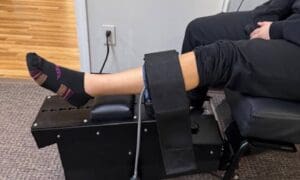Sponsored Feature

In today’s world, dealing with finances can be overwhelming. Hidden fees and charges, unexpected expenses, and saving for retirement and college are financial “gotchas” which can prove challenging.
Christal Apestegui, Financial Advisor with McMullin Stone & Associates in Fayetteville, says one of the biggest things many clients face is fear.
“Often it’s fear that keeps you from doing the right thing,” she says. “Maybe you don’t open a bill that comes in the mail because you don’t want to think about it. Or you ignore the payment deadline, which incurs more late fees. Or you don’t check your credit score, because you don’t want to see the bad news.
“The first thing to do is just take a deep breath, and know that facing financial fears head-on will most often serve you better in the long run. The consequences of not thinking about it are worse than just going ahead and dealing with it. That applies to both adults and young people. It’s something we all need to think about.”
Similarly, there are people who take a head-in-the-sand approach to retirement, Apestegui says, where if they don’t think about it, somehow it will work out. But reality is that simply putting away as little as $100 a month or just 3 percent of your income may have a substantial effect on your ability to retire down the road.
“And if it’s matched by your employer, with modest returns over time, you’ll end up in a better place than you thought you were,” Apestegui says. “But not thinking about it, and not doing anything about it, is not the way to go.”
Another financial “gotcha” is unexpected costs.
“I was talking to a 21-year-old this weekend who was telling me how she had to replace the tires on her car,” Apestegui relates. “And then when she took it in for an oil change, she was told that the water pump needed to be replaced. This is the car that she relies on and needs for work every single day.
“Fortunately, she had an emergency fund that she could pull from, because her only other alternative was to put it on her credit card. So it’s important to have that emergency safety net, even if it’s just a couple hundred dollars, for any unforeseen cost.”
For people middle-aged or older, Apestegui recommends having six to nine months’ worth of living expenses in a savings or money market account where it’s accessible, yet not exposed to the market. That way, in case of an extended health crisis or loss of job, there’s no need to dip into retirement savings or rely on high-interest credit cards.
A third “gotcha” faces parents with children 18 or older, Apestegui says.
“You need to make sure they’ve signed two important documents, one being a durable power of attorney and the other being a healthcare proxy,” she explains. “A lot of times parents think, ‘Well it’s my child. If something happens to them, of course I’m going to be involved.’ But the fact is, once they turn 18, they’re an adult, and unless you have a signed document, you won’t be able to make medical decisions or help with financial matters that may come up if there’s an emergency.
“If they were to walk out the door and have a car accident, who would have access to pay their bills, or to talk to their insurance company, or discuss medical decisions for them? Those are basic, yet really important questions.”
For older persons, particularly couples, it’s best to have an adult child or other trusted person with that authority so they wouldn’t be relying on each other to make vital decisions during periods of shock or distress. Anybody trying to do this should meet with an estate planning attorney to talk through their situation and make sure that the documents reflect what they want to have happen.
Apestegui has one final piece of advice for parents with seniors in high school, and that is to not delay completing the Free Application for Federal Student Aid (FAFSA) because so many universities and colleges offer financial aid on a first-come, first-served basis.
“As part of that, you need to talk to your student about how much college costs, how much you expect to contribute, and how much he or she will be responsible for,” says Apestegui, who once worked in college financial aid. “I think that circles back to that first gotcha about fear. But again, delaying the conversation with your student, or delaying filling out this application, can have really significant consequences down the line.”
==============
To learn more about the services offered through McMullin Stone & Associates, email Christal Apestegui at [email protected] or call 770-471-6674. McMullin Stone & Associates is located at 101 Devant Street, Ste 903 Fayetteville, GA 30214.
Securities offered through Raymond James Financial Services, Inc. member FINRA/SIPC. Investment advisory services offered through Raymond James Financial Services Advisors, Inc. McMullin, Stone & Associates is not a registered broker/dealer and is independent of Raymond James Financial Services. Opinions are those of Christal Apestegui and not necessarily those of RJFS or Raymond James. Expressions of opinion are as of this date and subject to change without notice.












Leave a Comment
You must be logged in to post a comment.